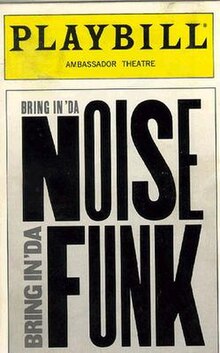Bring in 'da Noise, Bring in 'da Funk
| Bring in 'da Noise, Bring in 'da Funk | |
|---|---|
 | |
| Music | Daryl Waters Zane Mark Ann Duquesnay |
| Lyrics | Reg E. Gaines George C. Wolfe Ann Duquesnay |
| Book | Reg E. Gaines |
| Productions | 1995 Off Broadway 1996 Broadway |
Bring in 'da Noise, Bring in 'da Funk is a musical that debuted Off-Broadway at the New York Shakespeare Festival/Public Theater in 1995 and moved to Broadway in 1996. The show was conceived and directed by George C. Wolfe, and featured music by Daryl Waters, Zane Mark and Ann Duquesnay; lyrics by Reg E. Gaines, George C. Wolfe and Ann Duquesnay; and a book by Reg E. Gaines. The choreography was by Savion Glover.
Productions
Bring in 'da Noise, Bring in 'da Funk premiered off-Broadway at the Public Theater's Newman Theatre on November 3, 1995, and closed on January 28, 1996, after 85 performances. Directed by George C. Wolfe with costumes by Karen Perry, set design by Ricardo Hernandez, lighting by Jules Fisher and Peggy Eisenhauer, and Production Managed by Bonnie Metzgar. The cast included Savion Glover, Duquesnay, Gaines, and Dulé Hill.
The musical moved to the Ambassador Theatre on Broadway, opening there on April 25, 1996. The show closed after 1135 performances on January 10, 1999. The opening night cast included Jeffrey Wright, Glover, Duquesnay and Hill. Again directed by Wolfe, with sets and lighting by the off-Broadway team, costume design was by Paul Tazewell. Glover left the show but returned for 40 performances from December 8, 1998, through January 10, 1999.[1]
Glover toured with the musical in 2002.[2]
The Original Broadway Cast recording was issued by RCA Victor (09026-68565-2).[3]
Concept
Bring in 'da Noise, Bring in 'da Funk is a musical revue telling the story, through tap, of black history from slavery to the present. The musical numbers are presented along with supertitles, projected images and videotapes and with continuing commentary.
Wolfe took the rap words of Reg E. Gaines and turned them into "tap/rap (tap dancing informed by hip-hop and funk rhythms)."[4]
Songs
|
|
Response
In his interview for The New York Times, Ben Brantley wrote: "Mr. Glover has found choreographic equivalents for the black experience in the days of plantations, urban industrialization, the Harlem Renaissance and latter-day race riots...This sense of flaming individuality is finally what the evening is about: not just the collective history of a race but the diverse and specific forms of expression that one tradition embraces."[6]
The review in Entertainment Weekly said that the show is "an explosive and bravely literal-minded chronicle of the genre's history from slavery to the present. The music is beautiful and the dancing exuberant, but Funk is serious business, with vicious, funny send-ups of Uncle Tomism in Hollywood."[7]
Writing for The New York Times, Margo Jefferson stated that: "as dance, as musical, as theater, as art, as history and entertainment, there's nothing Noise/Funk cannot and should not do."[4]
The musical made an "extraordinary political statement ... as well as the equally significant growth in dance this show launched."[2]
Awards and nominations
Original Broadway production
| Year | Award | Category | Nominee | Result |
|---|---|---|---|---|
| 1996 | Tony Award | Best Musical | Nominated | |
| Best Book of a Musical | Reg E. Gaines | Nominated | ||
| Best Original Score | Daryl Waters, Zane Mark, Ann Duquesnay, George C. Wolfe and Reg E. Gaines | Nominated | ||
| Best Performance by a Leading Actor in a Musical | Savion Glover | Nominated | ||
| Best Performance by a Featured Actress in a Musical | Ann Duquesnay | Won | ||
| Best Direction of a Musical | George C. Wolfe | Won | ||
| Best Choreography | Savion Glover | Won | ||
| Best Costume Design | Paul Tazewell | Nominated | ||
| Best Lighting Design | Jules Fisher and Peggy Eisenhauer | Won | ||
| Drama Desk Award | Outstanding Musical | Nominated | ||
| Outstanding Actor in a Musical | Savion Glover | Nominated | ||
| Outstanding Director of a Musical | George C. Wolfe | Nominated | ||
| Outstanding Choreography | Savion Glover | Won | ||
| Outstanding Lighting Design | Jules Fisher and Peggy Eisenhauer | Won | ||
References
- ^ "Glover returns to 'Bring in 'Da Noise, Bring in 'Da Funk'". New York Amsterdam News. December 30, 1998.
- ^ a b Collins, Karyn D. (April 2003). "Bring in 'da Noise, Bring in 'da Funk. - dance review". Dance Magazine. Archived from the original on 4 February 2011. Retrieved 2024-11-23 – via FindArticles.
- ^ "Bring In Da Noise, Bring In Da Soundtrack CD Album". cduniverse.com. Retrieved January 13, 2010.[dead link]
- ^ a b Hill, Errol G.; Hatch, James V. (2008) [2003]. "13: The Millennium". A History of African American Theatre. Cambridge Studies in American Theatre and Drama. Cambridge: Cambridge University Press. p. 439. ISBN 978-0-521-62443-5. Retrieved 2024-11-23 – via Internet Archive text collection.
- ^ "Bring in 'da Noise, Bring in 'da Funk". guidetomusicaltheatre.com. Retrieved January 13, 2010.
- ^ Brantley, Ben (16 November 1995). "Story of Tap as the Story of Blacks". Theatre. The New York Times. p. C15. Archived from the original on 2015-03-15. Retrieved 16 January 2022.
- ^ Cagle, Jess (14 June 1996). "Bring in 'da Noise, Bring in 'da Funk". Entertainment Weekly. Retrieved 16 January 2022.
